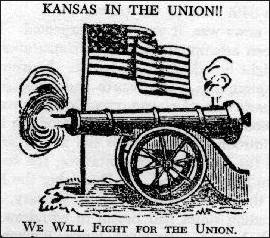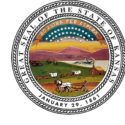When we hear suggestions that Puerto Rico can’t become a state until it gets back on its feet again, we should all remember Kansas. Kansas became the 34th state in 1861, on the eve of the Civil War when eight states had already seceded from the United States.
The Territory of Kansas was in the middle of a bitter battle over slavery. In 1854, the territory was organized and opened to settlement. The bill that accomplished this also reversed the Missouri Compromise. That compromise was a rule that said that no part of the Louisiana Territory north of Missouri could make slavery legal. The bill ended the Missouri Compromise and allowed Kansas to vote on whether to allow slavery or not.
Both abolitionists and pro-slavery groups poured into Kansas. The competition over the question of slavery led to shocking events of violence. It was as though the Civil War had already started in Kansas. Kansas was determined to achieve statehood, though.
“Border ruffians” interfere with the constitution
A territory that wants to become a state has to write a constitution and have it approved by Congress. Puerto Rico has already done this. But Kansas had a hard time with this task.
Four different constitutions were drafted, alternating between allowing slavery and forbidding it. There was so much controversy over slavery, and so many people coming to live in Kansas specifically to have an effect on this issue, that voting was unreliable. One early vote for the territorial government had 6,307 in favor of the pro-slavery candidate. However, the entire population of eligible voters in Kansas was only 2,905. “Border ruffians” from Missouri were sneaking across the border to vote in Kansas. This made all the votes held there unreliable.
Congress wouldn’t approve any of the first three constitutions Kansas sent in. Kansas Territory at this point was better known as “Bleeding Kansas,” and violence continued to escalate. At one point, there was a vote between “constitution with slavery” and “constitution without slavery.” The anti-slavery group decided to boycott the bill, so the “with slavery” version won. Controversy over the vote kept Congress from accepting this version of the state constitution as well.
At the same time that Kansas was seeing the political disagreements that would soon erupt into the Civil War, there was a terrible drought leading to famine. Settlers in Kansas Territory had to rely on food donations shipped in from the states. There were also continuing skirmishes between the Native Americans who had already lived in Kansas before the settlers from the States started moving in, and the new settlers. Women in Kansas were struggling for their rights, too. They were not able to get the vote in Kansas, but they were able to gain the right to vote in school district elections and to own property, which was not the case in every state or territory. Life was very hard in Kansas throughout their fight for statehood.
Congress admits Kansas before war begins
The fourth constitution made Kansas a free state, and this was approved in 1859. A bill to admit Kansas as a state was finally introduced in Congress. There was much debate over the admission of Kansas. Most of the controversy was over slavery. However, there were those who wanted Kansas to become a state so the planned railroad across the country could be built, and the competition between the Republican and Democratic parties was also part of the controversy. A number of states had seceded from the Union by the end of that year. With the senators and congressmen from those states gone from the U.S. Congress, Kansas was admitted.
A Kansas newspaper which had been publishing for just days scooped the story, saying,
The day was given up to general rejoicing. Those who entertain the singular notion that the people of Kansas didn’t want to be admitted, would have been startled by the demonstrations of yesterday. Then hurra for the STATE OF KANSAS! Our days of probation have been long and tedious, but we believe the future, upon which we are about entering, will amply compensate for the dangers and toils of the past.
Six days after Kansas became a state, the Southern states which had seceded from the Union got together to form the Confederacy. Three months later, war broke out.

Kansas chose as its state motto, “Ad astra per aspera,” which means “to the stars through difficulties.” This recognition of the territory’s hard path to statehood was accurate. And the hard times weren’t over.
Two thirds of the men from Kansas joined the Union Army and fought against the Confederacy in the Civil War. This was the highest proportion of any state. Both African-American and white soldiers fought in the war, and nearly 8,500 died for their country.
Guerilla fighters in the state continued the brutal violence that had been going on for years in the run-up to the war. Jayhawkers on one side and bushwhackers on the other conducted what were essentially gang wars outside of the official military battles. One of the most famous incidents was the burning of Lawrence, Kansas, where nearly 200 men and boys were murdered and the town torched.
Kansas recovered from the war along with the rest of the nation, and Kansas now enjoys the political and economic benefits of statehood along with its sister states.
Lessons for Puerto Rico
The territory of Puerto Rico and the territory of Kansas have a lot of similarities:
- Fierce political conflicts in the territory, including boycotts of votes
- Equally fierce national controversy influencing opinions on the territory’s statehood
- Natural disaster and serious economic hardship
- Citizenship just before a war, and high participation in the military
- Repeated rejection by Congress
Kansas became a state. Puerto Rico will become a state.
Kansas faced plenty of resistance. For years, the people of Kansas continued to work toward admission as a state, even though they faced terrible problems in their territory. Join us in working for statehood for Puerto Rico during the work of rebuilding the Island.








No responses yet